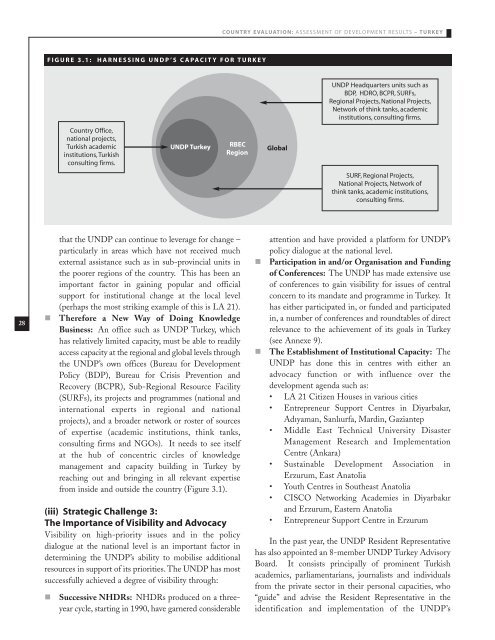Reports - United Nations Development Programme
Reports - United Nations Development Programme
Reports - United Nations Development Programme
You also want an ePaper? Increase the reach of your titles
YUMPU automatically turns print PDFs into web optimized ePapers that Google loves.
COUNTRY EVALUATION: ASSESSMENT OF DEVELOPMENT RESULTS – TURKEY<br />
FIGURE 3.1:<br />
HARNESSING UNDP’S CAPACITY FOR TURKEY<br />
UNDP Headquarters units such as<br />
BDP, HDRO, BCPR, SURFs,<br />
Regional Projects, National Projects,<br />
Network of think tanks, academic<br />
institutions, consulting firms.<br />
Country Office,<br />
national projects,<br />
Turkish academic<br />
institutions, Turkish<br />
consulting firms.<br />
UNDP Turkey<br />
RBEC<br />
Region<br />
Global<br />
SURF, Regional Projects,<br />
National Projects, Network of<br />
think tanks, academic institutions,<br />
consulting firms.<br />
28<br />
<br />
that the UNDP can continue to leverage for change –<br />
particularly in areas which have not received much<br />
external assistance such as in sub-provincial units in<br />
the poorer regions of the country. This has been an<br />
important factor in gaining popular and official<br />
support for institutional change at the local level<br />
(perhaps the most striking example of this is LA 21).<br />
Therefore a New Way of Doing Knowledge<br />
Business: An office such as UNDP Turkey, which<br />
has relatively limited capacity, must be able to readily<br />
access capacity at the regional and global levels through<br />
the UNDP’s own offices (Bureau for <strong>Development</strong><br />
Policy (BDP), Bureau for Crisis Prevention and<br />
Recovery (BCPR), Sub-Regional Resource Facility<br />
(SURFs), its projects and programmes (national and<br />
international experts in regional and national<br />
projects), and a broader network or roster of sources<br />
of expertise (academic institutions, think tanks,<br />
consulting firms and NGOs). It needs to see itself<br />
at the hub of concentric circles of knowledge<br />
management and capacity building in Turkey by<br />
reaching out and bringing in all relevant expertise<br />
from inside and outside the country (Figure 3.1).<br />
(iii) Strategic Challenge 3:<br />
The Importance of Visibility and Advocacy<br />
Visibility on high-priority issues and in the policy<br />
dialogue at the national level is an important factor in<br />
determining the UNDP’s ability to mobilise additional<br />
resources in support of its priorities. The UNDP has most<br />
successfully achieved a degree of visibility through:<br />
<br />
Successive NHDRs: NHDRs produced on a threeyear<br />
cycle, starting in 1990, have garnered considerable<br />
<br />
<br />
attention and have provided a platform for UNDP’s<br />
policy dialogue at the national level.<br />
Participation in and/or Organisation and Funding<br />
of Conferences: The UNDP has made extensive use<br />
of conferences to gain visibility for issues of central<br />
concern to its mandate and programme in Turkey. It<br />
has either participated in, or funded and participated<br />
in, a number of conferences and roundtables of direct<br />
relevance to the achievement of its goals in Turkey<br />
(see Annexe 9).<br />
The Establishment of Institutional Capacity: The<br />
UNDP has done this in centres with either an<br />
advocacy function or with influence over the<br />
development agenda such as:<br />
• LA 21 Citizen Houses in various cities<br />
• Entrepreneur Support Centres in Diyarbakır,<br />
Adıyaman, Sanlıurfa, Mardin, Gaziantep<br />
• Middle East Technical University Disaster<br />
Management Research and Implementation<br />
Centre (Ankara)<br />
• Sustainable <strong>Development</strong> Association in<br />
Erzurum, East Anatolia<br />
• Youth Centres in Southeast Anatolia<br />
• CISCO Networking Academies in Diyarbakır<br />
and Erzurum, Eastern Anatolia<br />
• Entrepreneur Support Centre in Erzurum<br />
In the past year, the UNDP Resident Representative<br />
has also appointed an 8-member UNDP Turkey Advisory<br />
Board. It consists principally of prominent Turkish<br />
academics, parliamentarians, journalists and individuals<br />
from the private sector in their personal capacities, who<br />
“guide” and advise the Resident Representative in the<br />
identification and implementation of the UNDP’s

















